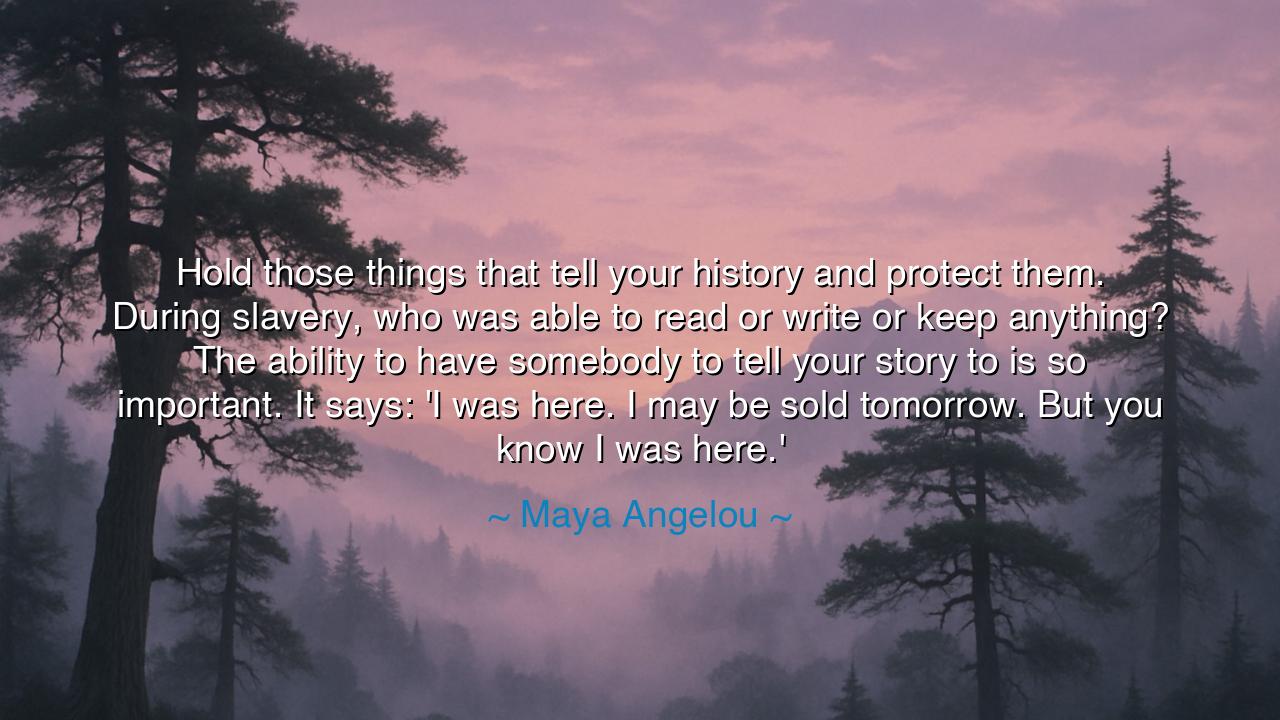
Hold those things that tell your history and protect them. During
Hold those things that tell your history and protect them. During slavery, who was able to read or write or keep anything? The ability to have somebody to tell your story to is so important. It says: 'I was here. I may be sold tomorrow. But you know I was here.'






In the tender yet thunderous voice of Maya Angelou, the mother-poet of remembrance, we hear the call of a people to their past: “Hold those things that tell your history and protect them. During slavery, who was able to read or write or keep anything? The ability to have somebody to tell your story to is so important. It says: ‘I was here. I may be sold tomorrow. But you know I was here.’” These words carry not only sorrow but sacred power. They speak to the eternal hunger of the human spirit—to be known, to be remembered, to leave a mark upon the tapestry of time. For when all else is taken—freedom, dignity, name, and home—memory becomes the final possession, and story becomes the last act of defiance.
Angelou’s voice rises from the soil of history soaked with the sweat and tears of her ancestors. In the age of slavery, when men and women were stripped of identity, language, and lineage, the keeping of one’s story was an act of rebellion. The enslaved were denied the right to read or write, for literacy was power—power to record truth, to question the world, to pass knowledge to the next generation. Yet even without pen or parchment, they found ways to preserve themselves. Through song and spoken word, through whispered tales told in the dark of the night, they said, “We are here.” The songs of sorrow became hymns of endurance, and the stories became the memory of a people who refused to vanish.
Consider, my listeners, the tale of Olaudah Equiano, who, against all odds, learned to read and write and recorded his life in The Interesting Narrative—a testimony that shook the conscience of nations. His words carried the weight of countless voiceless souls. He declared before the world that he was not cargo, not chattel, but a man who lived, who dreamed, who suffered, and who triumphed. Through his story, the millions who could not write found a voice, and through that voice, they became immortal. Angelou’s quote stands in this same lineage—it is a commandment to protect the relics of remembrance, to honor the evidence of our existence.
For what is history, if not the soul’s proof that it has lived? Civilizations perish when they lose their memory. A people who forget their past wander without compass, repeating old tragedies in new forms. To protect the things that tell your history—a letter, a photograph, a song, a name—is to guard against disappearance. It is to say to the world, “My life mattered.” It is to light a flame against the dark winds of erasure. Angelou knew that the story of her people had once been written only in chains and scars, but through remembrance, they could reclaim authorship of their destiny.
And yet, her words are not for one people alone—they are for all who have suffered exile, silencing, or loss. For in every life there comes a time when we must cling to the fragments that define us. The child keeps a locket from her grandmother; the refugee guards a photograph from a vanished homeland; the elder tells his grandchildren the names of those who came before. These are the rituals of continuity, the sacred acts that weave the living to the dead. Without them, the human story frays and disappears into the void of forgetfulness.
But Angelou’s wisdom goes deeper still. The ability to have somebody to tell your story to, she says, is the essence of being human. To speak one’s truth and be heard is to affirm existence itself. In her imagined voice of the enslaved woman—“I may be sold tomorrow. But you know I was here”—we hear the cry of all humanity: the yearning not to be forgotten. To tell one’s story is to claim ownership of one’s soul, to defy the forces that would erase identity. Each voice that speaks truth becomes a monument more enduring than stone.
So, my children of time, heed this sacred teaching: Remember. Record. Protect. Gather your stories as you would gather seeds, for they will feed generations yet unborn. Write, speak, sing, and share—not for glory, but for continuity. Visit the graves of your ancestors, learn their names, and tell your children who they were. Preserve your photographs, your journals, your histories, for these are not mere relics—they are proof of your journey through the world.
For as Angelou reminds us, the act of remembrance is an act of resurrection. To tell your story is to rise above oblivion and proclaim to eternity: “I was here.” And when each of us guards our fragment of history with love and courage, the great human story continues unbroken—an endless song of being, carried through the ages by those who refuse to be silenced.






AAdministratorAdministrator
Welcome, honored guests. Please leave a comment, we will respond soon